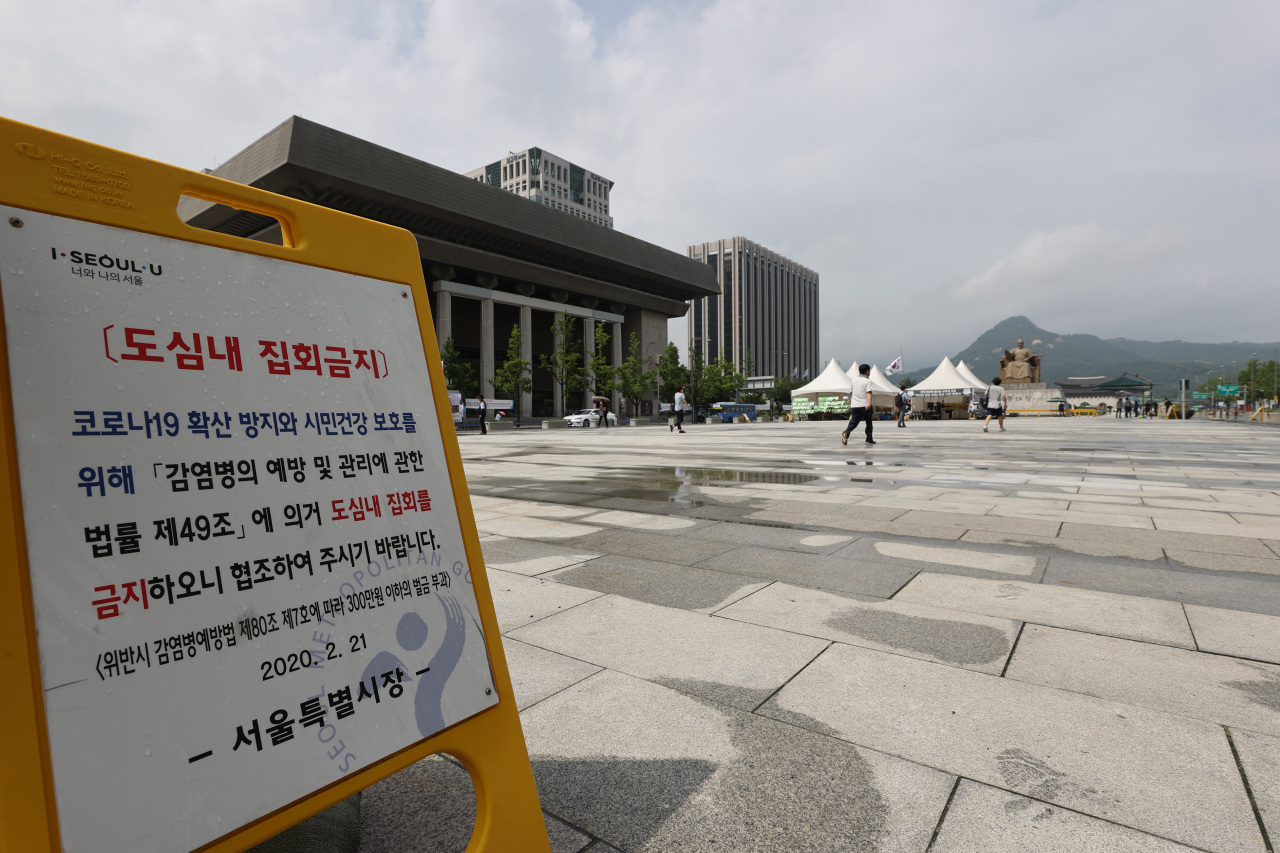
Seoul City and the police banned most of the rallies planned for National Foundation Day on Oct. 3 in line with social distancing rules amid political and social controversy over the right to protest.
Under the toughened social distancing rules, Seoul City has prohibited gatherings of 10 or more people until Sept. 13. Even if it decided not to extend those rules after Sept. 13, gatherings of 100 or more people would still be banned under the Level 2 social distancing rules in place nationwide.
“Seven groups have reported to the police plans to hold 27 rallies (for Oct. 3),” Kim Tae-gyun, director of the city government’s administration bureau, said in a press briefing Monday.
“Most of the rallies are planned to be held within the no-rally zones, including the Gwanghwamun area, so the police are notifying them that the rallies are prohibited.”
As of Sunday at midnight, the number of confirmed COVID-19 cases linked to the Aug. 15 Gwanghwamun rallies stood at 527 nationwide, including 120 in Seoul.
Based on mobile phone connection records and other data, the city government rounded up 12,963 people deemed to have had close contact with those confirmed positive who were linked to Aug. 15 rallies in Gwanghwamun, and 9,891 of them have been tested so far.
To evade government tracking, some conservative groups have called on participants to turn off their mobile phones when attending rallies.
The organizers of the Aug. 15 anti-government protests had filed an administrative action challenging Seoul City’s ban on the rallies, and the court ruled in favor of the plaintiffs, saying their planned assembly of about 100 people could be held in keeping with the social distancing rules.
But tens of thousands attended the rally organized by pastor Jun Kwang-hoon, who claims that the Moon Jae-in administration is seeking to put South Korea under communist North Korean rule.
Against this backdrop, ruling party lawmaker Rep. Lee Soo-jin said she will take steps to legally block large-scale rallies on Oct. 3.
“Even though Seoul City and the police have said they will ban the rallies, many Koreans are still worried because the court can give the green light to these protests,” Lee wrote on Facebook on Saturday.
“The current Administrative Litigation Act stipulates that an immediate appeal against the court’s decision to suspend the execution (of local governments’ ban on rallies) shall have no effect of suspending the execution, and I think it is necessary to revise this clause.”
An exception to the clause should be made so that, if an administrative body immediately files an appeal against the court’s decision to suspend the execution of a decision, based on the disease prevention agency’s opinion that its suspension could have serious consequences in terms of public health, the court’s decision would temporarily become ineffective, Lee said.
The judge-turned-legislator said she will submit such a bill, adding that she hopes the National Assembly passes the bill and prevents “terrorist groups” from threatening the people’s lives and safety.
Rep. Park Beom-gye, another judge-turned-lawmaker within the Democratic Party, said in his Facebook post Sunday that he thinks Lee’s proposal is absolutely reasonable.
Some critics of the Moon administration say the ruling bloc intentionally blamed the latest spike in COVID-19 cases on Jun and the Aug. 15 protesters as an excuse to clamp down on conservatives.
Jun has said the coronavirus is a conspiracy by the Moon administration aimed at shutting down his church.
A senior Cheong Wa Dae official told reporters last week that Jun should at least pretend he is sorry, as the number of confirmed cases linked to Jun’s church has exceeded 1,000.
“As for rallies planned outside the no-rally zones, Seoul City has banned them if they are large-scale assemblies such as one that expects 60,000 participants,” the city government’s Kim said.
“As the number of confirmed cases has increased with the Aug. 15 rallies, the city government and the police are banning them in advance under the law on assembly and demonstration.”
The city’s no-rally zones downtown include Seoul Station Plaza and the roads from there to Cheonggyecheon and Gwanghwamun Plaza; the three-way intersection in Hyoja-dong and nearby sidewalks; Sinmun-ro and nearby sidewalks; Jongno 1-ga and nearby sidewalks; and the road and sidewalks between Gwanghwamun Plaza and the Prime Minister’s Office.
The ward offices of Jongno-gu and Jung-gu also have their own no-rally zones to prevent the spread of COVID-19.
By Kim So-hyun (sophie@heraldcorp.com)







![[Graphic News] More Koreans say they plan long-distance trips this year](http://res.heraldm.com/phpwas/restmb_idxmake.php?idx=644&simg=/content/image/2024/04/17/20240417050828_0.gif&u=)
![[KH Explains] Hyundai's full hybrid edge to pay off amid slow transition to pure EVs](http://res.heraldm.com/phpwas/restmb_idxmake.php?idx=644&simg=/content/image/2024/04/18/20240418050645_0.jpg&u=20240419100350)






![[From the Scene] Monks, Buddhists hail return of remains of Buddhas](http://res.heraldm.com/phpwas/restmb_idxmake.php?idx=652&simg=/content/image/2024/04/19/20240419050617_0.jpg&u=20240419175937)

![[KH Explains] Hyundai's full hybrid edge to pay off amid slow transition to pure EVs](http://res.heraldm.com/phpwas/restmb_idxmake.php?idx=652&simg=/content/image/2024/04/18/20240418050645_0.jpg&u=20240419100350)

![[Today’s K-pop] Illit drops debut single remix](http://res.heraldm.com/phpwas/restmb_idxmake.php?idx=642&simg=/content/image/2024/04/19/20240419050612_0.jpg&u=)